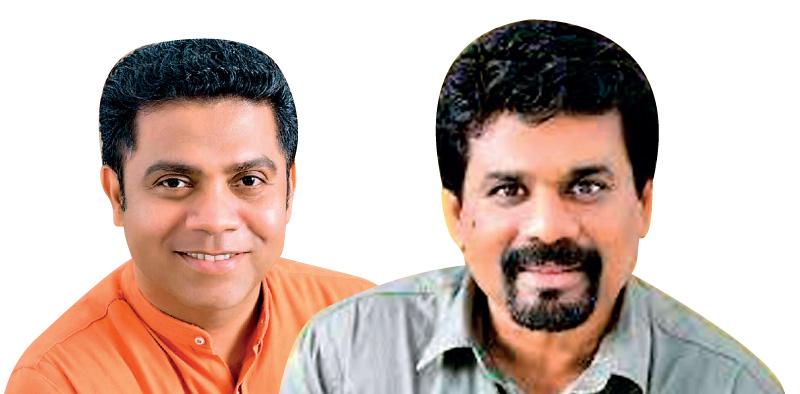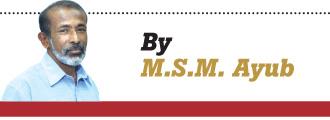Reply To:
Name - Reply Comment
Last Updated : 2024-05-25 22:04:00

 On the other hand, IMF Senior Mission Chief Peter Bruer announced on Tuesday that there is no fixed timeline for the disbursement of the second tranche of the EFF for Sri Lanka for two reasons including the debtors have not agreed upon a detailed debt restructuring process On the other hand, IMF Senior Mission Chief Peter Bruer announced on Tuesday that there is no fixed timeline for the disbursement of the second tranche of the EFF for Sri Lanka for two reasons including the debtors have not agreed upon a detailed debt restructuring process |
 The statement made by former JVP Parliamentarian Dr. Nalinda Jayatissa on the relationship between a future JVP/NPP government and the International Monetary Fund (IMF) is a clear deviation from his party’s policy on the global lender.
The statement made by former JVP Parliamentarian Dr. Nalinda Jayatissa on the relationship between a future JVP/NPP government and the International Monetary Fund (IMF) is a clear deviation from his party’s policy on the global lender.
Addressing the media after a discussion between the representatives of his party and the Government Medical Officers Association (GMOA), the JVP frontliner said that a future National People’s Power (NPP) government will never hesitate to work with the IMF and other institutions.
He told reporters that the NPP would deal with the IMF while respecting the people’s mandate and would be committed to implementing the proposals mandated by the people. Dr Jayatissa said the government was forced to adhere to whatever conditions set by the IMF as the government had failed to seek assistance “at the right time.”
When asked whether the NPP government would continue the IMF programme agreed upon by the present government, he stressed:
“We will discuss with the IMF and implement only the proposals that suit our mandate.”
He went on to express his confidence that any institution will honour the mandate of a government.
The argument that the IMF would act according to the conditions of a country that seeks its assistance is something that has to be proved in the future.
However, despite several rounds of negotiations, the staff-level agreement between the Sri Lankan government and the IMF did not seem to have contained any government proposal.
It mainly contained proposals such as cost-effective pricing of fuel and electricity, restructuring of State-Owned Enterprises and increasing tax revenue all of which in fact were included in IMF’s country report on Sri Lanka published in February last year - one month before the Gotabaya Rajapaksa Government decided to seek IMF assistance.
Leader of the JVP and NPP, Anura Kumara Dissanayake also pointed out that the IMF always stands its ground when dealing with member countries, especially the weaker ones.
A newspaper report on December 14, 2021, quoted Dissanayake as saying that the IMF primarily imposes three conditions on any country that seeks its assistance.
Cautioning the authorities for approaching the New York-based international lender, he said:
“First, they will ask us to let the rupee float. Secondly, they will ask us to remove all the import restrictions. Thirdly, they will ask the Government to reduce the expenditure, limit the appointments, and cut down the concessions. They will say that our state institutions will have to be converted to profit-making enterprises. These conditions will interrupt the lives of the general public.”
In a more recent statement, the General Secretary of the JVP, Tilvin Silva gave a clearer idea of how the JVP views the IMF.
Speaking at an event on March 21, this year – a day after the Executive Board of the IMF approved the 2.9 billion US dollar extended fund facility (EFF) for Sri Lanka - Silva stated that the EFF from the IMF will be an addition to the island nation’s existing debt burden.
“No country in the world has made it after going with the IMF. The IMF does not exist for the people but to save thieving governments,” he added.
Taken together with these and similar statements and views by JVP leaders in the past, Dr Jayatissa’s statement on Tuesday points to a policy deviation of the JVP with respect to the IMF. The guiding light for the party in this shift may most probably be the country’s current predicament in its foreign debt restructuring efforts.
It was the foreign debt burden and the resultant foreign exchange crisis that throttled Sri Lanka’s economy last year.
No country was prepared to help the crisis-hit country, first draining the fuel tanks in the country which in a chain reaction resulted in a threefold price hike of essential goods, miles-long and weeks-long fuel and gas queues, a 13-hour daily power cut and the declaration of bankruptcy of the country all of which ultimately forced President Gotabaya Rajapaksa to flee the country, as the economic crisis transformed into an unprecedented political crisis.
It was with the foreign exchange inflow that started with the culmination of an agreement with the IMF which was initiated by the deposed President Rajapaksa in March last year that the country finally gained a breathing space early this year. Yet, only time will tell the long-term success of the programme.
Addressing the foreign debt problem is an extremely vital issue in salvaging the nation from the current economic mess. Debt restructuring seems to be the only solution on which all can agree. The first to propose it among the main political parties were the Samagi Jana Balawegaya (SJB) and the NPP.
Leader of the NPP, Anura Kumara Dissanayake during an interview with the Daily Mirror on January 5, last year said:
“We must have talks with the institutions which lent these loans and immediately go for a debt restructuring plan for at least three years.”
However, it has now proved to be a gigantic task, even with the involvement of the IMF. Despite the international financial institutions such as the World Banka (WB) and the Asian Development Bank (ADB) having come forward to assist Sri Lanka after the IMF Executive Board approved an Extended Fund Facility (EFF) for the country last March, it must be noted that the said approval had been delayed for over six months due to the government’s failure to get a basic commitment from the foreign debtors for debt restructuring.
On the other hand, IMF Senior Mission Chief Peter Bruer announced on Tuesday that there is no fixed timeline for the disbursement of the second tranche of the EFF for Sri Lanka for two reasons including the debtors have not agreed upon a detailed debt restructuring process.
JVP now seems to have realized the difficulty in getting all debtors on board without the involvement of the IMF. It was against this backdrop that Dr. Jayatissa talked about working with the international lender. Besides, it has to be noted that he expressed those views while an IMF team was in Sri Lanka.
Earlier, with the massive transformations in the former socialist bloc, the JVP had shed the traditional Socialist theory which despises private ownership of “means of production” and its leader met the business community in August 2015 and last January in five-star hotels in Colombo.
He encouraged them to invest in “key areas such as production, storage, transport and the efficient management.”
Dissanayake also lashed out at Opposition Leader Sajith Premadasa for quoting from the JVP’s first policy declaration to criticize his party. He said Premadasa must be updated to understand that the said policy declaration was written 43 years ago at a time when there was a Socialist bloc of countries in the world.
Similarly, the JVP which was at the forefront against the North Colombo Medical College (NCMC) in the 1980s and the South Asian Institute of Technology and Medicine (SAITM) in recent years has changed its stance on private universities. The party now accepts the right of students to study in a private university while still stressing that education is primarily a responsibility of the State.
The Provincial Council system is another issue where JVP’s past and present times do not see eye to eye. The older generation might remember how ferociously the party fought against the system in its initial days.
However, Dissanayake said recently despite his party still being of the view that the PC system is a white elephant, it must remain since Tamils believe it is their right to have such a system.
Political parties cannot stay static. They also must adapt to the changes of the world and the time. However, such changes are a far cry from political parties changing policies for electoral gains, portfolios and perks.
Nuwan Saturday, 30 September 2023 07:10 AM
NPP is not JVP. However if Jayatissa is not in concert with the others, then there seem to be a breakdown in leadership? Tilvin is old school. People from rural and regional areas are still turning to the government for welfare and employment. If that is the mandate Jayatissa is talking about, that is not compatible with IMF. What's going to happen then?
Amaran Sunday, 01 October 2023 01:41 PM
It may be easy to throw lemon on to IMF. But, when you sit on the hot seat, if elected, then you will realise many things more practically.
sach Tuesday, 03 October 2023 11:28 PM
JVP is a set of confused people. And confused people back them too.

Add comment
Comments will be edited (grammar, spelling and slang) and authorized at the discretion of Daily Mirror online. The website also has the right not to publish selected comments.
Reply To:
Name - Reply Comment
For a long time, accusations have been made against Urban Development and Hou
The state-run loss-making State Mortgage & Investment Bank (SMIB) has reveale
US authorities are currently reviewing the manifest of every cargo aboard MV
On March 26, a couple arriving from Thailand was arrested with 88 live animal